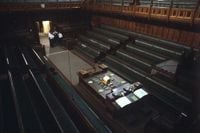On a day when the eyes of the nation were fixed on Westminster for the weekly spectacle of Prime Minister’s Questions, a startling security breach sent ripples through the heart of British democracy. Parliamentary authorities have temporarily barred members of the public from entering the Commons chamber after a hidden mobile phone was discovered during a routine security sweep just before the much-anticipated political showdown between Sir Keir Starmer and Kemi Badenoch. The ban, which took effect on Saturday, September 6, 2025, also extends to the House of Lords chamber, though other areas of Parliament remain accessible for visitors and staff.
According to reports from The Times and corroborated by statements from UK Parliament officials, the phone was found concealed near the front bench of the lower chamber. Its apparent purpose? To broadcast sex noises as a prank in the midst of the high-profile debate, an act that Scotland Yard believes was designed to cause maximum disruption to the business of the House. The incident has not only triggered a police investigation but also raised pressing questions about the adequacy of existing security protocols within one of the world’s oldest parliamentary institutions.
“While investigations continue, we have decided to temporarily limit full public tours in both Chambers from Saturday September 6, until further notice,” a UK Parliament spokesperson announced, as quoted by The Times. “Public access to the rest of Parliament is unaffected and remains open as usual. We have robust and proactive security measures in place in Parliament and the safety and security of everyone who works or visits here remains our top priority.”
The discovery of the phone, reportedly planted to play explicit noises during the weekly PMQs, has forced authorities to take the extraordinary step of restricting public access to the Commons and Lords chambers. For many, the ability to walk among the iconic green benches and witness debates firsthand is a cherished tradition—one that’s now on hold as the investigation unfolds. Tourists and visitors, who often come from around the world to observe British democracy in action, will have to content themselves with access to other areas of the Palace of Westminster, at least for the foreseeable future.
The timing of the prank could hardly have been more disruptive. Prime Minister’s Questions is a cornerstone of British political life, broadcast live and watched by millions both at home and abroad. It’s a moment when the Leader of the Opposition, in this case Sir Keir Starmer, faces off against government ministers—in this week’s session, notably Kemi Badenoch—on the most pressing issues of the day. The prospect of a deliberately timed interruption, especially one of such a salacious nature, has sparked concern not just about security, but also about the potential for political embarrassment and the erosion of decorum within the chamber.
Scotland Yard’s swift response underscores the seriousness with which the incident is being treated. In a statement, police said they believe the device was “purposely” placed with the explicit aim of disrupting parliamentary proceedings. The investigation now underway will seek to determine how the phone evaded existing security measures, who was responsible for planting it, and whether there are broader vulnerabilities that need to be addressed.
For those familiar with the daily workings of Parliament, the breach is both surprising and unsettling. Security at the Palace of Westminster is typically tight, with multiple layers of screening for both visitors and staff. The discovery of a hidden phone—especially one intended to play adult content in the midst of a live broadcast—has prompted renewed scrutiny of these protocols. Some observers have questioned whether recent changes intended to make Parliament more accessible to the public may have inadvertently created new opportunities for mischief or worse.
“The safety and security of everyone who works or visits here remains our top priority,” reiterated the parliamentary spokesperson, emphasizing that robust measures are in place and that the rest of Parliament remains open as usual. While this assurance may provide some comfort, it’s clear that the incident has exposed a gap in the system—one that authorities will be eager to close as quickly as possible.
Public tours of the Commons and Lords chambers have long been a highlight for visitors, offering a rare glimpse into the inner workings of British governance. The current ban, though temporary, is a stark reminder that even the most venerable institutions are not immune to modern-day pranks and security threats. For now, the green benches will remain off-limits to all but MPs, Lords, and essential parliamentary staff, as investigators search for answers and seek to restore confidence in the building’s security.
Reactions from within Westminster have been a mix of frustration and determination. While some MPs privately expressed embarrassment over the incident, others have called for a measured response, warning against overreacting in ways that might permanently curtail public access. “This is a deeply regrettable incident,” one unnamed MP told The Times, “but we must not lose sight of the importance of keeping Parliament open and accessible to the people it serves.”
Meanwhile, security experts have weighed in on the challenges of balancing openness with safety. The Palace of Westminster, with its labyrinthine corridors and constant flow of people, presents unique difficulties for those tasked with keeping it secure. “It’s a delicate dance,” said a former parliamentary security advisor, “between maintaining the transparency that is so vital to our democracy and ensuring that bad actors can’t exploit that openness for their own ends.”
As the investigation continues, attention will inevitably turn to the question of accountability. Was the planting of the phone the work of a lone prankster, or does it signal a more coordinated effort to disrupt parliamentary business? Could similar incidents be prevented in the future, or will new security measures be required? For now, these questions remain unanswered, but one thing is certain: the episode has jolted Westminster out of any complacency it might have harbored regarding its security arrangements.
For the thousands of ordinary citizens who look forward to walking among the green benches, the ban is a disappointment. Yet, as parliamentary authorities and Scotland Yard work to get to the bottom of the incident, there is hope that normal service will soon be resumed—albeit with a few lessons learned and perhaps a few extra security checks along the way.
The events of September 6, 2025, may well be remembered as a minor footnote in the long history of the House of Commons, but they serve as a timely reminder that even the most established traditions must adapt to the challenges of the modern world. Until further notice, the doors to the Commons chamber remain closed to the public, but the work of democracy goes on.




